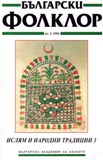Шейтанът и концепцията за греха в представите на българските мюсюлмани
The Sheytan and the Concept of Sin in the Notions of the Bulgarian Muslims
Author(s): Evgeniya Troeva-GrigorovaSubject(s): Anthropology
Published by: Институт за етнология и фолклористика с Етнографски музей при БАН
Summary/Abstract: The article outlines the connection between the sheytan (devil) and the concept of sin in the worldview of the Bulgarian Muslims. As a Quranic personage the sheytan plays a significant part in the Islamic legends of origin and eschatology. The apparent dualism in the divine sphere, set by the opposition between Iblis and Allah during the creation of Man, is transferred into the micro-cosmos of every human being, interpreted in the categories of righteousness and sin. According to the Muslims, the sheytan is actively present in every man’s life, urging him to transgression, and this is a possibility for the believer to prove his sincerity to God. The idea of a continuous control of the deeds, exercised by a couple of supernatural beings (two angels or an angel and a sheytan), puts forward the question of the freedom of man’s choice. This choice (between good and evil) influences the man’s life, as well as his destiny after death. Through the image of the sheytan different aspects of everyday life are given meaning too; common norms of behavior are promoted; actions, interrelations and states, which are dangerous for the individual or the community, are marked. In a broader sense, the image of the sheytan in Islamic ideology can be interpreted as a reflection of man’s inclination to rationalize his own behavior.
Journal: Български фолклор
- Issue Year: XXXII/2006
- Issue No: 2
- Page Range: 50-63
- Page Count: 14
- Language: Bulgarian
- Content File-PDF

